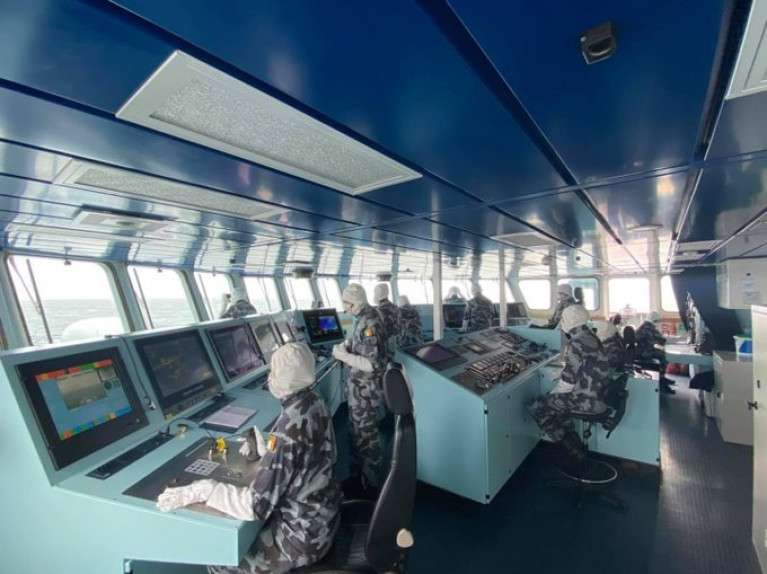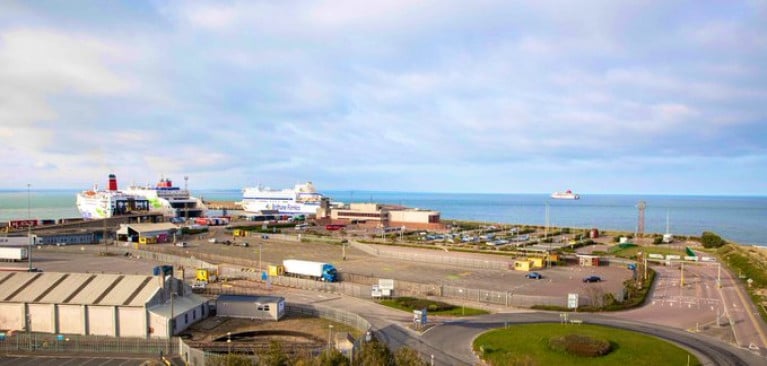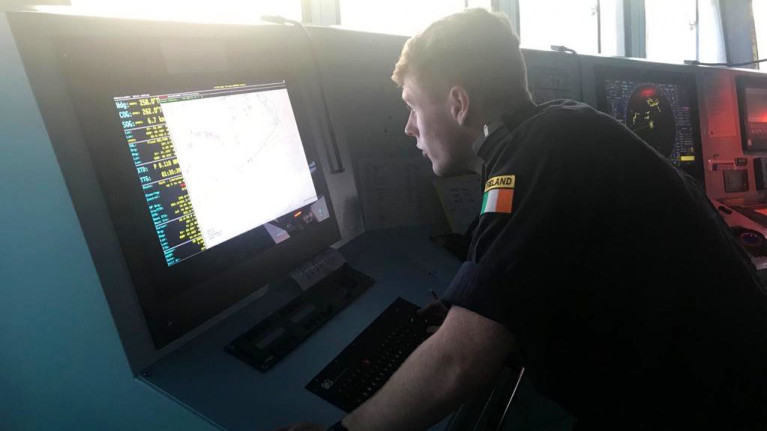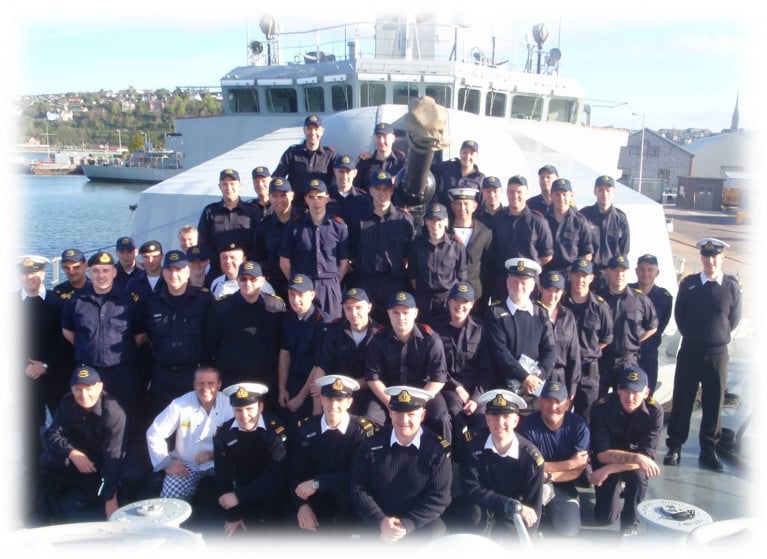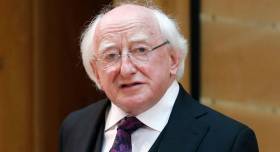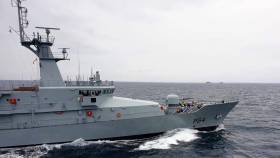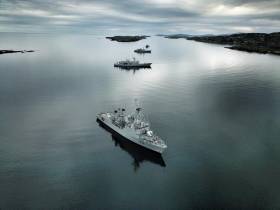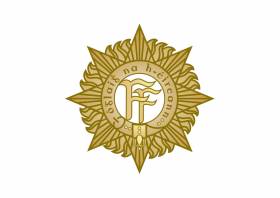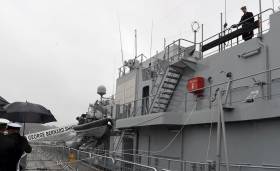Displaying items by tag: Defence Forces
The Defence Forces have said they are “aware” that two Russian Federation-flagged ships equipped with sub-sea cable technology have doubled back towards the Irish west coast late this week.
The two commercial ships, named Umka and Bahktemir, departed from the Russian port of Murmansk on February 23rd on a course for the Equatorial Guinea port of Malabo.
The two ships were identified on the Marine Traffic global ship tracking map off the Irish west coast early this week.
After leaving the Irish Exclusive Economic Zone, they turned round and steamed north, where they were identified off the north Kerry coast west of Dingle yesterday (Thurs).
The Irish Times had reported that the ships “raised serious concerns among Irish military officials due to their movements around the IRIS high-speed, subsea communications cable, which became operational last year and runs west off the Galway coast”.
The newspaper said that “later analysis determined the ships’ unusual movements were probably a result of efforts to avoid bad weather, rather than anything sinister”.
Surveillance of vital subsea communications cables has been increased since reported sabotage last September of the Nord Stream pipelines, built to transport gas from the Russian Federation to Germany through the Baltic. The pipelines are owned by the Russian company Gazprom.
The 79.8 metre-long Umka is an offshore supply vessel, and the Bakhtemir, also 79.8 metres long, is a salvage and rescue ship. It is equipped with diving platforms and subsea submersibles capable of deep-water work on infrastructure.
In a statement, the Defence Forces said that the Air Corps and the Naval Service are “aware” of the two vessels but “won't be releasing any further information on the operation”.
Both the Air Corps and Naval Service “continue to monitor activity in Irish waters and to undertake Maritime Defence and Security Operations (MDSO) throughout Ireland's maritime domain”, the statement said.
Call from PDFORRA for Automatic Citizenship after Five Years in Defence Forces Service
PDFORRA the representative group of the Defence Forces, has called for automatic citizenship to be given to non-nationals who have completed five years' service in the Army, the Naval Service or the Air Corps and who have attained a conduct rating of good during that time.
Gerard Guinan, General Secretary of PDFORRA (Permanent Defence Force Other Rank) said non-nationals who were serving the State were having to spend thousands of euro in a protracted process to become Irish citizens.
According to figures supplied to PDFORRA by the Defence Forces, more than 200 non-nationals have successfully applied to become members of the Army, the Naval Service and the Air Corps over the past five years.
Membership of the Defence Forces is open to people who are not Irish citizens, but who are from other EU member states, along with Britain, Iceland, Liechtenstein and Norway.
Membership is also open to people who have been granted refugee status in Ireland.
More from RTE News here.
Rosslare Europort Quarantine Measures Begin at Ferryport
At the ferryport of Rosslare Europort and tucked away at the rear of the terminal building are two large green tents, flanked by several defence forces SUVs, reports New Ross Standard.
The newly erected 'holding area' is evidence of the new quarantine system which came into play at all entrance points to Ireland on Friday - including the Wexford port.
Under the new rules, anyone arriving into Ireland from a list of 33 'high-risk' countries will be legally required to undertake a mandatory two-week quarantine at one of four Dublin hotels costing a minimum of €1,875. While it was reported that the old Hotel Rosslare had been looked at as a possible quarantine facility, this has not come to pass and anyone arriving at Rosslare who is required to quarantine will be brought to the capital.
Although Rosslare is unlikely to see too many people who have passed through the 33 countries, most of which are in South America and Africa, new rules also state that passengers arriving into the country without a negative PCR test taken a maximum of 72 hours before arrival, will be forced to wait in mandatory quarantine until they return a negative test.
This means that any passengers arriving in Rosslare, excluding truck drivers and crew, from France, Spain or the UK will be legally required to present a negative Covid test. If they don't, they'll be brought to the 'holding area' tents at the rear of the terminal building, where they will be tested before the defence forces bus them out to a mandatory quarantine facility in Dublin where they will pay at least €150 per day until a clear test is returned.
Further reading on the story here.
The role of Ireland in overseas peacekeeping missions could well be enhanced when Defence Forces numbers are back up to the minimum establishment strength of 9,500.
Minister for Defence Simon Coveney has revealed he's in favour of the Naval Service mounting further overseas missions such as joining an anti-piracy task force off the Horn of Africa, or on migrant rescue operations like previous ones carried out in the Mediterranean Sea.
He revealed that in 2015 plans were being drawn up to send a navy ship to the waters off the Horn of Africa to thwart raids on international commercial shipping by Somali pirates.
Mr Coveney said deployment was being looked at when the migrant crisis started to unfold off the coast of Libya.
More on this story writes Irish Examiner here which previously on Sunday reported the manpower crisis in the Naval Service which could see two more ships tied up by the end of the year.
Afloat adds that if that scenario arose the number of operational patrol vessels in the naval fleet would be reduced by almost half, from a total of 9 down to four ships. So far the flagship HPV LÉ Eithne along with CPV LÉ Orla has been tied up since last year at the Naval Base on Haulbowline Island, Cork Harbour.
During the height of the Covid-19 crisis, the flagship was temporarily drafted back into service to assist the HSE when berthed at Cork City.
The representative body of Irish Defence Forces Officer grades has warned that if immediate, significant retention initiatives are not implemented, the forces will not only never return to its target strength of 9,500, but will continue to decline.
As RTE reports, the Representative Association of Commissioned Officers (RACO) issued the warning in a briefing document for Oireachtas members.
RACO focuses on the staff recruitment and retention crisis in the Defence Forces, noting that despite Government commitments to boost numbers, they have fallen to an all-time low of 8,485 due to an "unsustainably high" staff turnover rate of 10.5% last year.
At the end of April, the Army had 6,867 members, the Naval Service had 892, while the Air Corps had 726.
In 2019, 870 Defence Forces members left the service, while 605 joined - a net loss of 265.
There are currently 1,015 vacancies, up from 327 at the end of 2017
In addition RACO highlights the impact of Covid-19 restrictions which will exasperate matters and more can be read here
Criticised: President Higgins on Pay for Defence Forces
Ministers reports The Irish Examiner, have described comments by President Michael D Higgins that members of the Defence Forces should have sufficient incomes as “deeply unhelpful”.
Mr Higgins’s comments on Wednesday night caused widespread surprise, anger, and bemusement in Government circles yesterday over what was seen as “interference” in political matters.
As Fine Gael ministers, TDs, senators, and MEPs gathered in Garryvoe, east Cork, for their party’s think-in ahead of the Dáil’s return, Mr Higgins’s comments were widely commented upon.
“Of course they were deeply unhelpful,” one senior minister said. “We are trying to hold a public pay deal together with sticky tape and Blu-Tack. This will only heighten the pressure on us to loosen the purse strings even further.”
Speaking publicly, Agriculture Minister Michael Creed hit a most undiplomatic tone, saying he found the President’s decision to comment “quite unusual”.
The newspaper has more here on this ongoing issue.
In an announced from the Government an action plan to deliver a €10 million package to restore pay to members of the Defence Forces.
As RTE reports, the Government said the package will immediately improve the take-home pay of members of the Defence Forces.
Minister for Finance, Public Expenditure and Reform Paschal Donohoe said work on the high-level plan to implement the recommendations of the Public Service Pay Commission would begin immediately.
He said the Government was committed to making steady improvements in pay to public servants but only to the extent that they are affordable and sustainable.
Minister of State with responsibility for the Defence Forces Paul Kehoe said the package was recognition by the Government of the challenges of recruitment and retention within the army, navy and air corps.
For more from the launch by the Minister of the new package click this link.
It is expected that the Government will announce a new review of pay for up to 2,500 members of the Defence Forces with specialist or technical skills.
The move, writes The Irish Times, will be in addition to the proposed increase in allowances which the Government is set to announce this week as part of an initiative to address recruitment and retention problems in the military.
Ministers are expected to say that the review of military specialists’ pay could be completed within months.
Among those likely to be encompassed by such a review would be cooks, mechanics, technicians, fitters, carpenters, aircraft mechanics, military police investigators and air-traffic controllers.
Minister for Public Expenditure Paschal Donohoe is to bring proposals to the Cabinet for pay improvements for members of the Defence Forces based on the recommendations of the Public Service Pay Commission.
The Government is expected to announce a new review of pay for up to 2,500 members of the Defence Forces with specialist or technical skills.
The move will be in addition to the proposed increase in allowances which the Government is set to announce this week as part of an initiative to address recruitment and retention problems in the military.
Ministers are expected to say that the review of military specialists’ pay could be completed within months.
Among those likely to be encompassed by such a review would be cooks, mechanics, technicians, fitters, carpenters, aircraft mechanics, military police investigators and air-traffic controllers.
Minister for Public Expenditure Paschal Donohoe is to bring proposals to the Cabinet for pay improvements for members of the Defence Forces based on the recommendations of the Public Service Pay Commission.
The €10.1 million package of measures will centre on increases in allowances paid to members of the Defence Forces rather than rises in core pay.
Military service allowances, which currently range from €42 to €123 per week, would be raised by 10 per cent as part of a move to improve recruitment and retention of personnel under consideration by the Government.
Reductions in other allowances imposed in 2013 are also expected to be reversed as part of the package.
The patrol duty allowance of €48 per day for Naval Service personnel at sea would also be increased by about €5 under the proposals.
In addition, a loyalty bonus – which could be up to €19,000 – is expected to be put in place to encourage pilots to remain in the Defence Forces.
If approved by the Government, the increased allowances would come into effect immediately.
For more on the story including non-pay initiatives click here.
In addition as previously featured Naval Patrol vessels including flagship LE. Eithne to be docked out of service due to staff shortage.
The Defence Forces are currently conducting surface live firing practice shoots off West Cork, as per Marine Notice No 12 of 2019.
The practice shoots from today, Tuesday 28 May, to Thursday 30 May are taking place in Danger Area D13, in the coastal area south-south-west of Cork between Seven Heads and Galley Head and to seaward from 8am to 5pm daily.
The Danger Area comprises the sea area contained within the co-ordinates. The co-ordinates of area D13 are as follows:
| Latitude | Longitude |
|---|---|
| 51° 34.12’N | 008°42.36’W |
| 51°20.12’N | 008°34.36’W |
| 51°17.36’N | 008°48.48’W |
| 51°31.42’N | 008°57.06’W |
For the periods while the range is active, this sea area is out of bounds to all vessels. A Naval Service patrol vessel will enforce the Danger Area D13.
All vessels are advised that they are required to remain outside of the exclusion zone whilst the range is active, and are also recommended to carefully monitor the Radio Navigation Warnings that will be broadcast during the firing period.
#navy - Irish Government must address the crisis in the Defence Forces which has now reached the point where its effectiveness is so broken that it can no longer guarantee the security of the State and its citizens, a protest march by former members of the Defence Forces has heard.
Almost 1,500 former members of the Defence Forces, writes The Irish Times, from the Army, Air Corps and Naval Service marched in the second Respect and Loyalty Parade through Cork city to highlight poor pay and conditions.
Parade organisers said 166 personnel left the Defence Forces in the first three months of 2019, while a high-profile recruitment campaign last year led to a net gain of just three and the overall number in the Defence Forces now stands at around 8,500, 1,000 less than the recommended minimum number of 9,500.
Retired Lt Col Dan Harvey addressed a rally in the Grand Parade, saying that it was a sad day when retired members of the Defence Forces felt they had to march to highlight the situation in which their currently serving comrades find themselves.
For further comments made by the retired colonel and more click here.


























